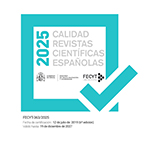Posibilidades de la investigación documental para el análisis interseccional de las políticas de igualdad
Resumen
En este artículo se abordan las posibilidades de la investigación documental para el análisis interseccional de las políticas de igualdad de género. Para ello, se plantea un análisis de los planes estratégicos de igualdad, vigentes en 2019 (o más recientes), desarrollados en España a nivel estatal y autonómico. Se examinan dos cuestiones centrales: 1) el reconocimiento de la interseccionalidad y de las desigualdades múltiples; y 2) la atención a grupos situados en posiciones múltiples de desigualdad. Los resultados muestran una incorporación muy limitada del marco interseccional en los planes de igualdad de género, aunque sí se atiende (aunque de forma variable) a distintos ejes de diversidad y desigualdad: principalmente, la edad / ciclo vital, el territorio y la exclusión social. El análisis documental ha permitido localizar las problemáticas interseccionales objeto de atención en distintos ámbitos sociales: principalmente, educación, violencia y políticas de inclusión social. Al mismo tiempo, se produce la infrarrepresentación de los intereses y necesidades de mujeres racializadas, migrantes y de minorías étnicas, así como una insensibilidad a la diversidad afectivo-sexual. El análisis crítico, reflexivo y situado que se plantea desde la interseccionalidad puede ayudar a incrementar la eficacia y la equidad de las políticas de igualdad de género al fijar la mirada en grupos y problemáticas situados en las intersecciones de múltiples desigualdades.
Descargas
Descarga artículo
Licencia
La revista Investigaciones Feministas, para fomentar el intercambio global del conocimiento, facilita el acceso sin restricciones a sus contenidos desde el momento de su publicación en la presente edición electrónica, y por eso es una revista de acceso abierto. Los originales publicados en esta revista son propiedad de la Universidad Complutense de Madrid y es obligatorio citar su procedencia en cualquier reproducción total o parcial. Todos los contenidos se distribuyen bajo una licencia de uso y distribución Creative Commons Reconocimiento 4.0 (CC BY 4.0). Esta circunstancia ha de hacerse constar expresamente de esta forma cuando sea necesario. Puede consultar la versión informativa y el texto legal de la licencia.











